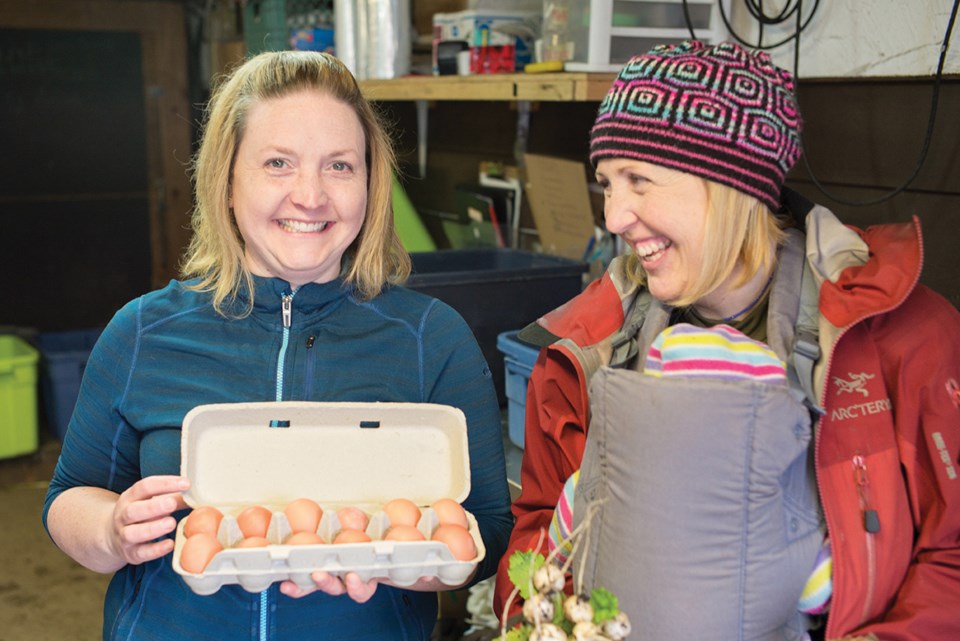With a little baby strapped tightly to her chest, Lindsay Cornwell reaches down to grab a handful of fresh, dirt-speckled greens while Tracy Robertson weighs each bunch of produce before packing it into a large storage container.
Always beside each other at the local market, the two farmers partner every Thursday from 2 to 6 p.m. at the farmstand on 1524 Depot Road and sell items in a harvest box as members of the Community Supported Agriculture.
“People think there’s a massive farm community in Squamish,” says Robertson. “There isn’t. It’s just us and a few homesteaders.”
In fact, there are few operational farms with land in the District. Many of the farmers at the market come from Pemberton or out of town.
Robertson, the owner of Stony Mountain Farms, started in the fall of 2008 with chickens in her backyard. After graduating as an animal health technologist, she began raising turkeys as well.
“I just wanted to make sure that the animals raised for consumption had an appropriate life,” she explains. “Turkeys have the worst life and chickens are right behind them.”
Due to costly processor requirements, she won’t be selling chickens anymore but will still feature her famous eggs, turkeys and heritage pigs who are birthed in her backyard of three and a half acres.
The animals roam outdoors and are never overfed.
“Our animals get their nutrients from whatever is outside,” she says. “They’re not rooting around in a barn.”
Her day starts before sunrise and she can average below minimum wage after expenses, like many other farmers, Robertson says.
The dream is to be on 15 to 20 acres. But that seems impossible in Squamish, she adds, because there isn’t much farmland left and what exists is very expensive.
Cornwell, the co-owner of Nutrient Dense Farm with her husband Stefan Butler, agrees. They operate their farm, which is split across four locations — five acres at the Queen of Peace Monastery and three plots out of people’s backyards in town. But two of those homes are for sale.
“We want five to 10 acres,” she says. “And being on one plot of land would be ideal.”
A holistic nutritionist by trade, Cornwell was inspired three years ago to join her husband because she wanted to nourish people where it all starts — the soil — and to help food security in the region.
They harvest the same day they sell, meaning the produce is nutrient rich. Cornwell says this is essential to fight disease, build the immune system and live a healthy life.
“For me, it’s feeding my family and our community the best food that we can,” she says. “It’s a total labour of love.”
They grow a variety of seasonal produce from root and storage crops to market greens, says Butler, who has farmed for the last 10 years. At the beginning, he says there was absolutely nothing in the way of local agriculture.
“Because the Valley is so steep, there’s little sun,” Butler explains, adding autumn rainfall is high and they’ve struggled with flash floods over the last two years.
The couple admits their model won’t work long term and plans to relocate in the future.
“I need one property and land security through ownership,” Butler says. “All of the land is developed and extremely expensive.”
Michalina Hunter and Darwyn Moffatt-Mallett, owners of Green Bee Honey, were thrilled when they found land to lease three years ago.
They have 50 hives and Hunter says they expanded exponentially this year, with a 100 foot fenced area holding the bees.
“We focus on making sure the bees are healthy, clean breeding from successful stock that makes it over winter,” Hunter says, whose long-term goal is to develop bees who can live without excessive chemical treatments.
The honey is sold out of their home as well as the fall fair and upcoming Christmas markets.
Xoco Chocolate Co. is featuring their honeycomb in a new chocolate this season.
The couple wants to start a meadery making honey wine. “It would be so wonderful to buy a piece of land that we can make into a bee paradise,” says Hunter, acknowledging they can’t afford to by in Squamish and are looking at Vancouver Island.
Mike Holmes is the owner of Squamish Valley Hops Farm and leases the land to Green Bee Honey. The group met at the first Sea-to-Sky beekeepers meeting a few years ago.
He’s been farming hops on a portion of the property since buying it five years ago. A craft beer enthusiast, Holmes found hops an interesting crop, though difficult to grow.
“I knew if I could grow it, I could sell it,” he explains, adding hops require big infrastructure, like an 18 ft. trellis, five acres and years to mature.
Holmes grows cascade, chinook, and triple pearl hops, to name a few and was featured in a new fresh hops beer from A-Frame Brewing Company this month.
The hops are certified organic, so yields are lower than conventional farmers. This prompted Holmes to join other farmers in creating the BC Hop Growers Association. Large-scale organic is hard to do without a huge workforce, says Holmes.
“There’s no way I could make this farm happen now,” Holmes admits, not just because of the cost of land but also equipment. “We don’t get a lot of support from any level of government.”
Unlike Pemberton, where farms are often sold with irrigation or agricultural equipment, Holmes bought bare land in the Squamish Valley and had to start from scratch.
“The soil is poor, sandy and acidic and it floods,” he explains but says he likes doing things the hard way.
Holmes hoped to subdivide seven acres of the property to friends wanting to create a small market farm but says agricultural regulations pose “unique challenges” that prevent him from leasing the land.
He worries that in two to three years there won’t be any land to grow food
on in Squamish. The new Official Community Plan attempts to address food systems and food security, according to the District.
“I think it’s important for the local government to take a good look at the future of farming in Squamish. It’s important for food security and
even tourism,” Holmes says. “It’s sad seeing all the farmers move out of the Squamish Valley.”





